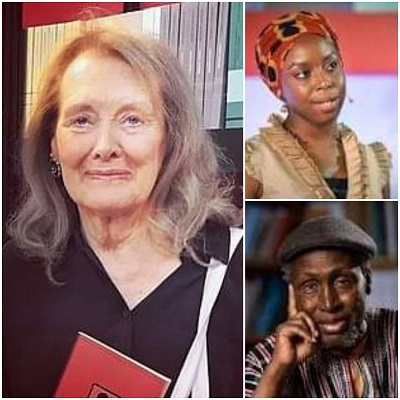
BY MULUGETA GUDETA
When last year the Nobel Prize for literature went to the African writer Gurnah, Nigerian Nobel winner Wole Soyinka, considered by many as the colossus African literature, said that the Prize had come back to the continent. This was both a scathing remark and an understated criticism that the Prize was taken away in favor of non-African writers. This was a true statement reflecting the biases, racial and cultural prejudices of the Nobel establishment often criticized for being too European.
This year too, the prejudice against black writers by the Nobel committee has returned to the surface with the granting of the prestigious ward to a French writer of little reputation and global impact. Writing in a blog page under the title “The Chase for the Literature Nobel Prize Crown”, the blogger Florian Zandt said that, “This year’s, i.e. 2021, laureate Abdulrazak Gurnah is only the fifth African being awarded the Nobel Prize in Literature.
According to the jury, the Tanzanian novelist received the prize “for his uncompromising and compassionate penetration of the effects of colonialism and the fate of the refugee in the gulf between cultures and continents”. While Gurnah’s win might be a start in addressing criticism of the laureate selection being too lopsided in favor of European men, African countries still fall far behind the places with the most winners as our chart indicates.”
The blog page Africa is a Country carried another biting criticism of the Nobel selecting committee in its October 10, 2022 blog page by saying that, “The award of the Nobel prize in literature to French author Annie Ernaux is both an occasion to reflect on the politics of prestigious literary prizes (even though Abdulrazak Gurnah won the prize last year, the inclusion of Africans remains wanting), and, to think more generally about the world of arts and letters itself.”
When will Nigerian Ngozi Adichie and Kenyan Ngugi wa Tiongo win the Prize?
Who is Annie Ernaux? According to one information, Annie Thérèse Blanche Ernaux (née Duchesne; born 1 September 1940) is a French writer, professor of literature and Nobel laureate. Her literary work, mostly autobiographical, maintains close links with sociology. Ernaux was awarded the 2022 Nobel Prize in Literature “for the courage and clinical acuity with which she uncovers the roots, estrangements and collective restraints of personal memory”. According to available data, “The French author Annie Ernaux has won the 2022 Nobel prize in literature at the age of 82. Of the 119 awarded, Ernaux is only the 18th woman Nobel laureate in literature and the first French woman to have won the prize.” Eighteen women writers have so far been granted the prize while no African woman has so far received one.
Personally, I know only one black woman who has won the prize for literature and that is African-American author Toni Morrison. While Eurocentric writers lament that only 18 women have so far won the prize no one seems to be concerned that only one black woman has so far grabbed the prestigious prize. This was not because there are no African women writers who deserve the honor but because of the prevailing race and gender bias that have subconsciously or deliberately dictated the choice of the Nobel committee.
Coming back to the question of racial prejudice in the selection of candidates for the prize, one is tempted to look at the case of Kenyan writer Ngugi wa Tiongo whose literary career span many decades and his reputation as the champion of the African poor and marginalized both in the pre and post-colonial periods, and has eluded the Nobel committee’s selection process. Ngugi has been on the list of possible candidates to in the prize although he is so far invisible to the Nobel selection committee.
Ngugi is a global champion of the anti-neocolonial politics of both Europe and the United States where he is now residing. The Nobel committee has never granted the award to an African writer whose politics contradicts the ideology of the Nobel establishment. Ngugi’s themes deal with the black human condition under neocolonialism and the destiny of the African tyrants who are continuing to oppress and steal their people. This is theme of Ngugi’s huge masterpiece, i.e. Wizard of the Crow, an end of century drama that engages neocolonialists, local tyrants and their victims. As such, Ngugi takes a global view of politics at the end of the 20th and the beginning of the 21st centuries. Thus no one can blame him for taking an “Afrocentric” position when it comes to life under neocolonial oppression in Africa.
The same can be said about Chinua Achebe who died without receiving the prize although he is considered the best African writer on the anti-colonial ideological spectrum and a fiery critic of the Nigerian elites who connived with Western political elites to steal from their own country and stash their loots in foreign banks while tens of millions of the African underclass suffer in untold misery, poverty and lack of freedom. As corruption has become an international or universal phenomenon, Achebe’s themes are as relevant as now as they were back in the 1950s and 1960s.
When we look into the comments on the blog page of Africa is a Country, we find comments like, Ernaux’s accolade follows a season of voluminous writing on her latest texts, treatments of her oeuvre as a whole, and assessments of her place in the broader canon. This is an output we rarely see for an African writer. Not just appraisals and commendations, but engagement that challenges too. Thirty years ago already, the Marxist critic Terry Eagleton proclaimed that “criticism today lacks all substantive social function. It is either part of the public relations branch of the literary industry, or a matter wholly internal to the academies.”
In other words, the whole cultural establishment in France had been waging a public relations campaign in the form of literary criticism or appraisals in its bid to get Annie Ernaux win this year’s Nobel Prize for literature. The blog page was rather blunt on this point. It said that, “Much as this is a widespread phenomenon, nowhere is the tradition of writing social critique aimed at a broader public more in jeopardy than in Africa. Most critical discourse is either the output of academics looking for forums to host scholarly work that otherwise would have collected dust behind journal paywalls, or, is opinion hastily composed from on high by public intellectuals who have grown accustomed to their cultural authority. Both tendencies fail to take the public seriously.”
The truth is that the European intellectual elites were praising their “own candidate” while African writers never enjoyed such a public relation backing in the form of literary criticism. Their works are largely unknown even within the continent because African intellectuals are fond of European or American writers rather than their own authors. Their education is entirely Western, thus tinged with neocolonial critical biases and prejudices. This may be why outstanding African writers like Ngugi have so far fail to appear on the list of potential Nobel candidates for literature.
Ernaux’s emergence from relative global darkness limited recognition to win the Nobel Prize might also be interpreted as a shift in French literary criticism from its tradition of relative honesty to growing bias in this age and time when the global struggle is between ideas of freedom and global oppression. This may also be seen as a thinly veiled betrayal of the French ideal encapsulated in the well-known motto of Liberty, Equality and Brotherhood. The struggle is not however stopping at this stage as more and more young African writers are taking up the theme of neocolonialism and globalized oppression in their works.
Nigerian young writer Chimamanda Ngozi Adichie works like Americanah make her an ideal candidate for future Nobel literary award. According to Encyclopedia According to Wikipedia, “Americanah is a 2013 novel by the Nigerian author Chimamanda Ngozi Adichie, for which Adichie won the 2013 U.S. National Book Critics Circle Award for fiction. Americanah tells the story of a young Nigerian woman, Ifemelu, who immigrates to the United States to attend university. The novel traces Ifemelu’s life in both countries, threaded by her love story with high school classmate Obinze. It was Adichie’s third novel, published on May 14, 2013 by Alfred A. Knopf. A television miniseries, starring and produced by Lupita Nyong’o, was in development for HBO Max, but then was later dropped.”
With time and maturity, Adichie may one day become the first African woman to win the Nobel Prize for literature. Other African writer may also come forward to claim the mantle while the racial and political bias of the Nobel Prize committee is bound to lose the battle or be forced to drop its black versus white mentality as the world continues to recognize and honor talent more than color.
It is however a long established African tradition to celebrate victors and congratulate this year’s winner of the Nobel Prize for getting recognition at the mature old age of 84 and the labor she put in to reach the summit of literary achievement. Will Ngugi win next year’s Nobel award? This is a question that must be on the hearts and minds of all Africans and his fans that are eager to see him prove that Africa too has its share of talented thinkers and writers who deserve the most prestigious award offered by a Western establishment.
The Ethiopian Herald 15 October 2022

